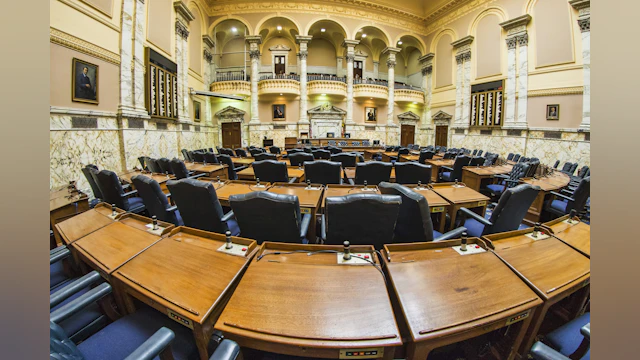Learn more about AFSP’s advocacy efforts and how you can get involved.
Each year, the American Foundation for Suicide Prevention’s State Capitol Day events provide an opportunity for volunteer advocates to meet with state officials and share their experiences, urging support for legislation that can save lives. Over the course of four months and in nearly every state, advocates gathered for in-person, virtual, and hybrid events that united suicide loss survivors, those with lived experience, and lawmakers in a shared mission to improve access to mental health services and prevent suicide in their state.
The State Capitol Day events featured guest speakers from state agencies and legislatures, as well as other experts in the mental health field. Volunteer advocates were trained on the basics of advocating for mental health and suicide prevention and policy issues impacting their state. Advocates also had the opportunity to meet with their state legislators to share their personal stories about why mental health and suicide prevention are important to them, and to educate lawmakers on the top policy priorities for each event.
While the culture and the political landscape differs in each state, and while each AFSP State Capitol Day is unique, through these individual events legislators from New York to Wyoming received the same critical education with a unified message that echoed across the country: EVERYONE can help prevent suicide.
This year also highlighted the importance of collaboration and community – local AFSP chapters partnered with kindred organizations such as NAMI, MHA and local Lifeline call centers in 18 states. “There is a shared sense of community in coming together to speak with one voice on issues that really matter – the policies we advocate for save lives and improve mental well-being. AFSP is honored to be a part of these efforts in local communities around the country and to be able to help expand that collective voice,” said Laurel Stine, J.D. M.A., Executive Vice President and Chief Policy Officer, American Foundation for Suicide Prevention.
This year’s top policy priorities reflected the current concerns and issues impacting our communities as we mark two years of living amidst the COVID-19 pandemic, and aimed to improve access to mental health services for underserved and at-risk populations.
For the second year in a row, the top priority at every event was increasing funding for the 988 Lifeline and crisis response. Connecting individuals to mental health services and resources is vital to suicide prevention. By offering immediate help to anyone who may need it, crisis lines provide invaluable support at critical times. As 988 officially launches nationwide in July, it is crucial that states invest in their local call centers and the continuum of community crisis services that can support callers needing an in-person response, including mobile crisis teams and crisis stabilization centers.
"When people know where to get help, they live," said Utah State Senator Dan Thatcher during the state’s Capitol Day event. "When people are connected to help, when people are heard, when they are listened to, when they are connected to services, they live. That has been our focus and that has been our effort."
A 988 crisis services system that is effectively resourced and promoted will reduce healthcare spending with early intervention, reduce the burden on emergency rooms and law enforcement, and improve outcomes for individuals experiencing a mental health or suicidal crisis. It will also ensure more equitable access to and fill gaps in the current crisis response system, particularly those that affect marginalized and underserved communities. All individuals experiencing a behavioral health crisis should receive equitable and appropriate responses and care wherever they are, separate from law enforcement or emergency medical interventions.
Mental health and suicide prevention in K-12 schools was also a focus in several states, including Louisiana, Maryland and Missouri. Children and teens continue to experience significant stressors and disruptions related to the pandemic, leading pediatric health groups to declare a National Emergency in Child and Adolescent Mental Health. Children’s hospitals experienced 45% more self-injury and suicide cases January - June of 2021 compared to the same period in 2019. Even pre-pandemic, mental health challenges posed the biggest health risk for adolescents. From 2007 to 2018, there was a 60% increase in the suicide rate among youth and young adults ages 10-24.
Following the release of a February 2022 report from the Hopeful Futures Campaign that found all but two states fall significantly below nationally recommended ratios for school psychologists (1:500) and social workers (1:250), advocates urged legislators to provide funding for more nurses and mental health professionals in schools. They also supported bills to require schools to provide student mental health and suicide prevention education; allow for mental health absences; and adopt suicide prevention, intervention, and postvention policies.
Finally, AFSP lent its voice in opposition to bills in Alabama, Florida, Oklahoma, and Tennessee that established discriminatory policies and eliminated schools’ ability to provide safe and affirming spaces for LGBTQ youth, many of whom rely on schools for that acceptance and support. Researchers largely agree that elevated rates of suicidality (suicidal thoughts, plans and attempts) and poorer mental health found in LGBTQ people is associated with the social stigma, prejudice and discrimination put upon minority sexual orientations.
The introduction and passage of these bills create an added risk factor for young people across the country at a time when experts have declared a national youth mental health emergency. AFSP chapters joined the Trevor Project and local state equality organizations to increase grassroots support in opposition to these legislative efforts and show young LGBTQ people that they are heard, loved, valued and supported.
Thank you to all the advocates who took part in a State Capitol Day event this year, and a special thank you to our AFSP chapters and staff for their leadership at each event.
To learn more about the bills AFSP supports in your state, visit afsp.org/statebills.
Learn how you can become an AFSP Volunteer Field Advocate.
